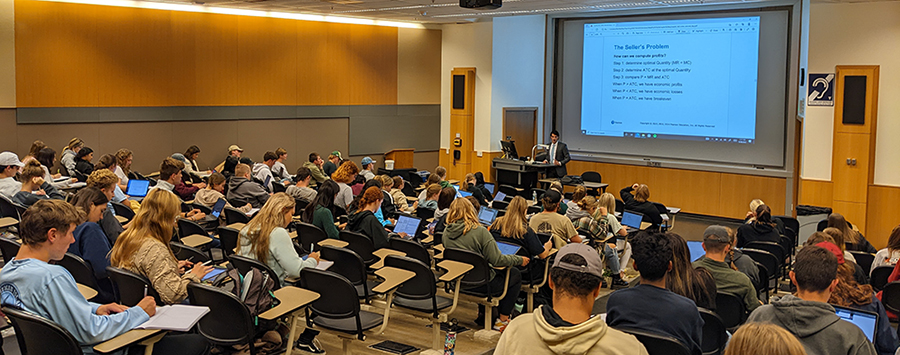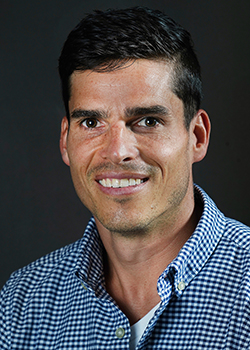
desire for advanced education IN AGRICULTURAL FINANCE leads alumnus (AND INCOMING FACULTY MEMBER) back to Purdue
 Chad Fiechter grew up near the small town of Ossian, just south of Fort Wayne. Like many Indiana-natives interested in agricultural studies, he says Purdue was the obvious choice when looking for a university. He would go on to earn a bachelors in agricultural economics in 2008; however, at the time, he hadn't put much thought into graduate studies.
Chad Fiechter grew up near the small town of Ossian, just south of Fort Wayne. Like many Indiana-natives interested in agricultural studies, he says Purdue was the obvious choice when looking for a university. He would go on to earn a bachelors in agricultural economics in 2008; however, at the time, he hadn't put much thought into graduate studies.
“My plan was to farm with my family so my focus was to get a degree as quickly as possible,” said Chad. “Once I graduated, I returned to the family farm and worked there for nearly 10 years.”
Then in 2018, he decided it was time to change career paths. An agronomist and family-friend suggested he look into graduate school. Chad remembered his time as an undergraduate at Purdue, specifically in Dr. Robert Taylor’s class. Dr. Taylor had earned his B.S. from Cornell, and in appreciation of his insights, Chad decided to follow in his footsteps and attended Cornell for master's studies with a focus on agricultural finance.
Upon finishing his first semester, Chad knew he wanted to continue on for doctoral studies and that aspiration led him back to Purdue.
“I realized I wanted to pursue a Ph.D. and Purdue’s Agricultural Economics Department has a distinguished legacy in agricultural finance research,” said Chad. “The strength of the department in my research area and the potential to return ‘home’ made Purdue an obvious choice.”
Now at Purdue, in what seems like an attempt to make up for lost time, Chad has been on a fast-track in the doctoral program. In his third year, he’s set to defend his dissertation this Spring. He’s using his background and 10 years of experience in farming to help inform his understanding of the problem.
“My dissertation is about how individuals form their expectations about what will happen in the future. Microeconomic theory tells us that individuals’ expectations are an important part of both the supply and demand of goods and services. However, our collective knowledge of how expectations are formed is limited.”
“As a farmer, my expectations about the future were pivotal in planting, marketing, and storage decisions. Often, I felt as though my expectations deviated from traditional economic theory. I am interested in understanding whether I am an irrational anomaly or farmers’ expectations are more nuanced than previously believed. I evaluate how information and access to information is reflected in farmer’s expectations, using data from the Purdue University- CME Group Ag Economy Barometer and a survey of Iowa farmland values. Additionally, I explore how an experience, like the US 1980’s farm financial crisis is reflected in expectations of Indiana farmland values.”
With graduation on the horizon and a career in academia in mind, Chad is also taking time to improve his teaching skills. This fall, he taught “Introduction to Microeconomics for Food and Agribusiness” to 130 undergraduate students and thanks the students for being patient during his teaching journey.
“I love microeconomics and have a passion for the students to understand the useful core insights. I have learned to be more purposeful in designing lectures which highlight these core objectives. At the beginning of the semester, I would get so excited about something in the lecture that I would spend too much time on extraneous topics. Creating materials which guide my teaching and students learning has been extremely helpful in the second half of this semester.”
In Spring 2023, Chad will be hitting some major milestones: teaching an econometrics course, finishing his dissertation, and surviving year one with twins. Yes, he and his wife did all of this with newborn twin girls at home! He’s also excited to have accepted a faculty position that will once again bring him back to Purdue University.
“This fall, I get the extraordinary privilege of joining the Agricultural Economics Department as an assistant professor in agribusiness finance. The position provides me the platform to research, teach, and participate in extension related to the financing of agricultural production. Purdue and the Agricultural Economics Department have been very good to me. I am extremely thankful and excited for the opportunity to join the faculty.”
He's also thankful to Professor Todd Kuethe for mentoring him along the way.
“On the first day at Purdue, Dr. Kuethe asked me about my career goals. Since that point, he has spent his time and energy providing resources and mentoring in order that I might be able to fulfill these goals. I came into the PhD program lacking training on communicating with both academic and non-academic audiences. Dr. Kuethe has given me books on writing, painstakingly coached me through editing, and generally inspired a desire to be an excellent written and oral communicator.”
